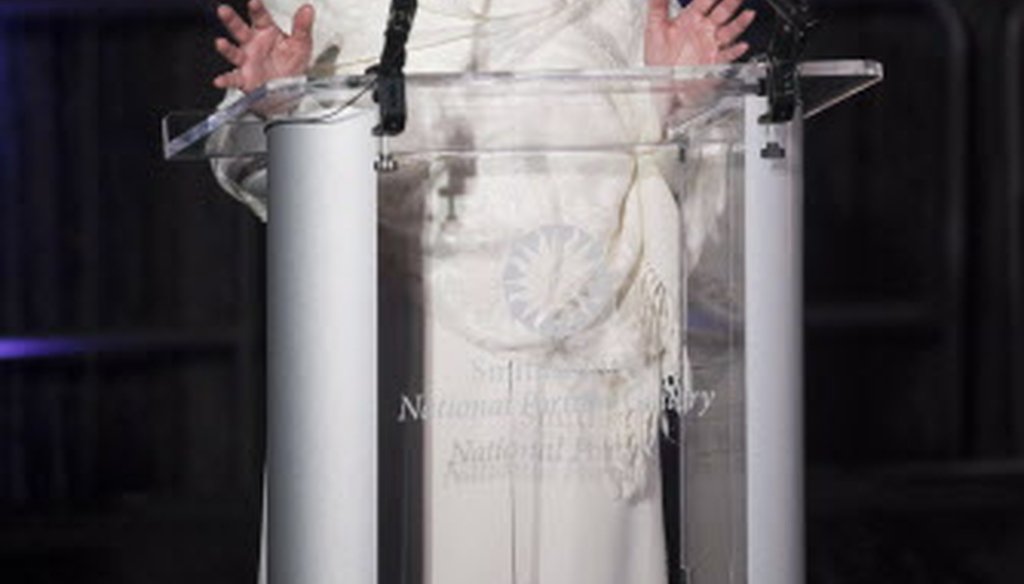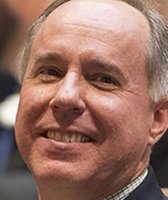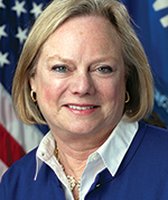Stand up for the facts!
Our only agenda is to publish the truth so you can be an informed participant in democracy.
We need your help.
I would like to contribute

Hillary Rodham Clinton speaks at the opening of "Votes for Women: A Portrait of Persistence" at the Smithsonian's National Portrait Gallery March 28, 2019, in Washington. (Associated Press).
Hillary Clinton may have fallen short at the ballot box in the Badger State, but the 2016 presidential contender topped one list: Our look at the most-clicked items from March 2019.
Here’s a look at PolitiFact Wisconsin’s High Five.
1. In Wisconsin, because a key provision of the Voting Rights Act was not in effect, "somewhere between 40,000 and 80,000 people were turned away from the polls (in 2016) because of the color of their skin" and other factors.
Clinton’s remarks were part of a March 3, 2019 program marking the 54th anniversary of the first civil rights march from Selma to Montgomery, Ala. Marchers that day were met and beaten by state troopers on the Edmund Pettus Bridge in what became known as "Bloody Sunday. "
Clinton was wrong about the impact of the Voting Rights Act not being in effect in Wisconsin making a difference, since the provision in question never applied to Wisconsin. Clinton also had problems with the numbers on both ends of her range.
What’s more, the claim -- and others like it -- put all of the blame for people not voting on the state’s photo ID law. That ignored other factors, such as a lack of enthusiasm from voters, or the belief -- one apparently shared by candidate Clinton -- that the state was a safe one for her in 2016 because she never campaigned in Wisconsin during the general election.
We rated the claim Pants on Fire.
2. Flip-O-Meter look at Evers and his pledge to ‘raise no taxes’
Wisconsin’s new Democratic Gov. Tony Evers spent months on the campaign trail saying he would consider raising taxes if elected, before a pre-election pivot.
"I’m planning to raise no taxes," the Democrat told The Washington Post on Nov. 1, 2018.
"I’m planning on raising no taxes," he told WISN-TV on Nov. 4, 2018.
But when Evers revealed his budget to state lawmakers Feb. 28, 2019, it included more than $1 billion in tax increases across the two-year period.
Asked about the reversal, Evers’ staff didn’t dispute the change but defended the rationale and results.
The reversal earned the governor a rating of Full Flop.
3. Story: Gov. Tony Evers’ record so far on promises a mixed bag
We use our Evers-O-Meter to track progress on many of the governor’s campaign promisesnow that he’s in office.
This is similar to our Truth-O-Meter, but for this effort we assign a rating based on the status of the promise: In the Works, Stalled, Compromise, Promise Kept or Promise Broken. We followed dozens of promises made by Republican Gov. Scott Walker during his two terms using the same scale.
Here are the promises we recently rated:
-- Raise no taxes. (Stalled).
-- Raise minimum wage to $15 an hour, with automatic inflationary increases. (In the Works)
-- Cut middle-class income taxes by 10 percent. (In the Works)
-- Dissolve and replace state economic development agency. ( Stalled)
4. In-state tuition available "for non-U.S. citizens after three years … veterans have to wait five years."
Five Republicans who are military veterans put out a joint news release criticizing Gov. Tony Evers’ budget for proposing that non-citizen immigrants be allowed to pay in-state tuition rates throughout the University of Wisconsin System and state technical colleges.
In the March 12, 2019 release, state Reps. Jesse James, Ken Skowronski, Jim Ott, John Spiros and Tony Kurtz said immigrants would get a break on tuition after three years, while military veterans must wait five years.
The claim was off on several counts. The available benefit for veterans is not discounted in-state tuition, but full coverage of all tuition and fees. And the five-year wait applies only to veterans who move to the state after their service time ends, not to all veterans. Many would get the larger benefits without any wait.
An updated news release changed the veterans reference in a graphic to say "Non-resident veterans have to wait 5 years before the remission."
Our rating: Mostly False.
5. "Over the last eight years, we’ve shown that even though we’ve cut taxes by $8 billion, revenues continue to grow."
State Rep. John Nygren, R-Marinette, co-chair of the powerful budget-writing Joint Finance Committee, in a string of tweets on Feb. 12, 2019, claimed Wisconsin’s financial outlook "is the strongest in a generation." In another tweet, he made the claim above.
The revenues portion of the statement is clearly accurate. The tax cut element is a bit more nuanced, but the changes Republicans made did result in a net savings of $8 billion for taxpayers compared to if the 2010-’11 tax levels had remained in place.
And we’ve rated very similar claims as True in the past.
We rated Nygren’s statement True.
Our Sources
PolitiFact Wisconsin

















































